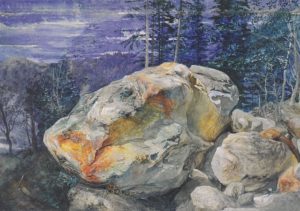Gaps In The Clouds
There are many spots among the inferior ridges of the Alps…, which, though commanding prospects of great nobleness, are themselves very nearly types of all that is most painful to the human mind. Vast wastes of mountain ground, covered here and there with dull grey grass or moss, but breaking continually into black banks of shattered slate, all glistening and sodden with slow tricklings of clogged, incapable streams; … like a beach of black scales of dead fish, cast ashore from a poisonous sea… (John Ruskin’s Notebooks).
Debbie and I hadn’t invited anyone to our Tent since the Golden Calf. It seemed as if everyone was social distancing, “Now Moses would take the Tent and pitch it outside the camp, at some distance from the camp. It was called the Tent of Meeting, and whoever sought God would go out to the Tent of Meeting that was outside the camp (Shemot 33:7),” wearing a mask of despair, “And God said to Cain, ‘Why are you distressed, And why is your face fallen? (Bereishit 4:7),” and stopped dressing up for work, “they went into mourning, and none put on his finery (Shemot 33:4).”
I urged Debbie to invite a few friends over just to break the cycle but she adamantly refused, “There’s something missing in the Tent!”
It looked the same to me – I had stacked old editions of the BNN (Biblical News Network) to cover the gaps in our display cases – for some unfathomable reason we still received daily Manna and water and our magical clouds provided temperature-controlled shelter.
“Debbie,” I said, “absolutely everything looks the same! What’s missing?”
“You mean besides all the gold pieces from our display cases? Everything looks as noble as ever, but there lies underneath something very painful, a gap, a hole, a vacuum… You’re the one who claims to be a rabbi (at least when Moshe’s not around), can’t you sense an absence? Can you not tell me what it is?”
I had sensed the change in the quality of the air of our home and the entire camp. I tried to blame it on the super-strong air-purifiers installed post-viral breakout, but I knew that despite the “commanding prospects of great nobleness, are themselves very nearly types of all that is most painful to the human mind.” It was as if the Clouds of Glory themselves had ceased to caress us with God’s direct love and were simply functional.
“Debbie, we have to invite people to our Tent and fill our homes with love for each other, work to actively fill the gaps with our efforts. We cannot passively wait for God to repair everything.”
So, Debbie hired a Shofar blower to stand before our tent each morning in invitation for all to feel lovingly welcomed to our home. Soon, everyone was inviting everyone. We filled the entire Camp with mutual love and the Clouds began to shimmer, touch us and inspire us. And Moshe declared, “May the favor of God, our Lord, be upon us; let the work of our hands prosper, O prosper the work of our hands (Tehillim 90:17)!”
We responded, “O you who dwell in the shelter of the Most High and abide in the protection of Shad- dai—
I say of God, my refuge and stronghold, my Lord, in Whom I trust (91:1-2).”
Eventually, we constructed a Dwelling Place for the Divine Presence, and, “When Moses had finished the work, the cloud covered the Tent of Meeting, and the Presence of the God filled the Tabernacle. Moses could not enter the Tent of Meeting, because the cloud had settled upon it and the Presence of God filled the Tabernacle (Exodus 40:33-35).”
Eventually, something yet greater happened, we build our personal Tents of Meeting, and transform them into Holy places filled with mutual love, love of God, and God’s love for us.
P.S.
I would think that the most effective way for a lot of the people for whom we are davening and the davening groups would be to have people decorate the succah with symbols of their sweetest experiences of Torah and Avoda from the past year.
Meaning to create an environment of a reflection of the sweetness and beauty of Torah. We should Daven that everyone should be in this very sweet, secure and safe environment. And in the same way that the Ribono Shel Olam says to Klal Yisroel, “ I have everything but, I want you to make a tiny Chupah for me so that the whole world knows how much I love you!
So, that all of us should be able to use a Succah, to build a Succah as a way of showing the world that Hashem is saying to us ” I love you so much you want your Succah” .
Because it is a symbol of Shidduch and especially those for whom we are davening for a Shidduch should be Zoche through their mitzvah of adding to a Succah or building a Succah or sitting in a Succah to create this Chupah for Hakadosh Baruch Hu that will then be replicated for in a beautiful Shidduch/ Chuppah for those we are davening for a shidduch.




